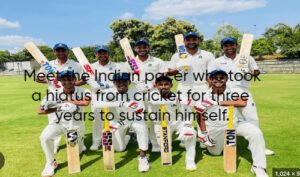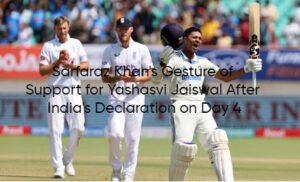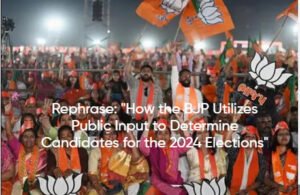Rephrase: “How the BJP Utilizes Public Input to Determine Candidates for the 2024 Elections”

New Delhi: Today, the Bharatiya Janata Party (BJP) is poised to unveil its roster of candidates for the upcoming Lok Sabha elections. Employing a multifaceted and rigorous process, sources reveal that the BJP meticulously integrated public feedback, internal assessments, and high-level strategic discussions to finalize the candidates set to represent the party in the forthcoming electoral contest.
In a late-night assembly yesterday, attended by senior leaders, including Prime Minister Narendra Modi, Home Minister Amit Shah, and party president JP Nadda, the ruling party engaged in extensive dialogues concerning the candidates for the 543 Lok Sabha seats, anticipating the formal announcement of the poll schedule by the Election Commission. The prevailing anticipation suggests that the elections will likely transpire in April-May.

On-Ground Engagement
Leveraging technology, the BJP facilitated public feedback from grassroots levels via the Namo App. Departing from traditional methods, the party solicited input from locals regarding the performance of incumbent MPs and their perceptions of the three most influential leaders in each region. This grassroots-driven approach aimed to align candidate selection with the sentiments and aspirations of local communities.
Over the past two years, the BJP has consistently sought feedback from its MPs, evaluating their performance and addressing concerns. To bolster the decision-making process, the BJP collaborated with survey agencies to compile comprehensive reports on each parliamentary constituency.

Ministers were assigned the task of visiting Lok Sabha constituencies, compiling reports, and offering valuable insights into the performance of incumbent MPs.
The accumulated data from ministers and organizational sources were deliberated upon in state-level election committee meetings, forming the groundwork for the final candidate selection process. Following these discussions, state-level BJP groups engaged in deliberations with top leaders such as Mr. Nadda, Home Minister Shah, and General Secretary BL Santosh.
The BJP’s outreach extended beyond party lines, with concerted efforts to attract candidates from other political factions. The BJP leadership emphasized that MPs with underwhelming performances risked losing their tickets, with an estimated 60-70 incumbents potentially facing ticket cancellations to make room for fresh faces.

The party anticipates that many of its MPs from the Other Backward Classes (OBC) community will seek re-election. In the 2019 general elections, the BJP celebrated victory as 85 of its OBC MPs emerged triumphant.
New Contenders, Familiar Faces
In a meeting commencing close to 11 pm yesterday and lasting over four hours, the BJP reportedly prioritized gaining or consolidating its position in seats where it faced defeat in the 2019 elections.

It is speculated that several Union ministers, including Bhupender Yadav, Dharmendra Pradhan, and Mansukh Mandaviya, could receive nominations for the general elections. Notably, during the recent polls to the Rajya Sabha, the party refrained from extending another term to these ministers.




